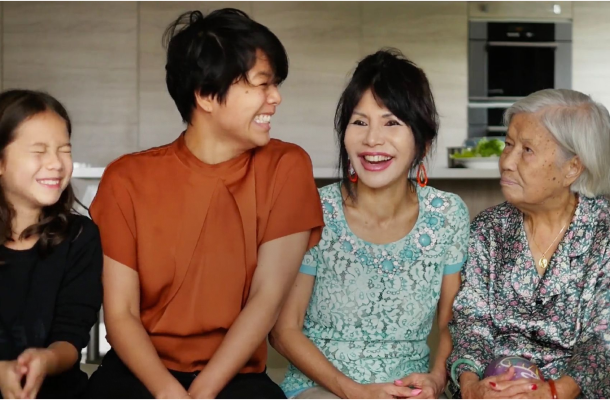Trauma and Healing in "Les Rivières" (The Rivers, 2020)
A grandmother's recovery in France uncovers intergenerational trauma within a Vietnamese family. 'Les Rivières' explores complex expressions of love and the challenges of bridging generational gaps


Mai Hua's short documentary film, Les Rivières (The Rivers), focuses on four generations of her matriarchal family: Marthe, Hong Loan, Truc Mai (Mai Hua), and Tam. The story begins with Mai Hua taking the sickly Marthe (her grandmother), to France to recover and recuperate. As a doctor, Hong Loan's intensive care leads to Marthe's remarkable recovery. However, is Marthe happy in France? Is she hiding any emotional pain? Do the other generations in the household understand Marth's emotional struggle and how can they help her? This documentary contains visceral lessons for all of its generations, to be revealed and found among family members.
Les Rivières provides the audience with a humanistic understanding of matriarchal family life, which requires a profound emotional intimacy. The film’s use of close-up shots accentuates the disagreements between generations, and shows how vast the generation gap between family members can be; several moments capture an emotional rawness that may be difficult on sensitive viewers. Mai Hua’s work also evokes a sense of intergenerational trauma, manifested in a person’s expectations of their children or grandchildren. In Les Rivières, she also captures how, within a Vietnamese family, love is expressed differently among all of the matriarchs, and how expressions of love are misinterpreted by the young and old. This personal family story suggests that even in a close-knit matriarchal family, relationships between generations require time, patience, and sympathy. Les Rivières is a stirring work, containing open wounds that can only be treated with the understanding and love of one’s family.
Beyond the narrative of Marthe's recovery, the film delves into the subtle undercurrents of family dynamics, revealing the unspoken tensions and the quiet acts of love that bind these women together. The unfamiliar landscape of France, while offering physical healing, also serves as a stark backdrop against which the family's emotional vulnerabilities are laid bare. The language barrier, the cultural differences, and the shared history they carry with them create a palpable sense of displacement, adding another layer of complexity to their interactions.
Mai Hua's lens doesn't shy away from capturing the awkward silences, the frustrated sighs, and the fleeting moments of misunderstanding that punctuate their days. These moments, often captured in unflinching close-ups, are not meant to be sensational, but rather to illuminate the raw, unfiltered reality of familial relationships. They remind us that even within the most loving families, communication is a fragile bridge, easily broken by unspoken expectations and unresolved pain.
The film's exploration of intergenerational trauma is particularly poignant. It's not about assigning blame, but about understanding how the weight of the past can shape the present, how patterns of behavior and emotional responses are passed down through generations, often without conscious awareness. The expectations placed on each woman, the unspoken rules they are expected to follow, are all manifestations of this inherited legacy.
And yet, despite the tension and the pain, there are also moments of profound tenderness, of quiet understanding. A shared meal, a gentle touch, a knowing glance – these small acts of love, often misinterpreted or overlooked, are the threads that weave the family together. Les Rivières reminds us that love within a Vietnamese matriarchy is not a singular, uniform entity, but a complex tapestry of individual expressions, each unique and often misunderstood.
Ultimately, Les Rivières is a film about healing, not just physical healing, but emotional and spiritual healing. It's a testament to the power of empathy, the importance of patience, and the enduring strength of familial bonds. It's a reminder that even the deepest wounds can be healed, not by quick fixes or easy answers, but by the slow, painstaking work of understanding and loving one another.